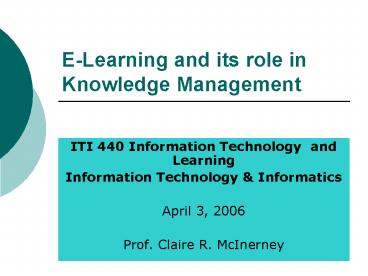ELearning and its role in Knowledge Management PowerPoint PPT Presentation
1 / 25
Title: ELearning and its role in Knowledge Management
1
E-Learning and its role in Knowledge Management
- ITI 440 Information Technology and Learning
- Information Technology Informatics
- April 3, 2006
- Prof. Claire R. McInerney
2
What the bleep is knowledge management and what
the bleep does it have to do with
organizational learning?
3
Todays Agenda
- A Look at Lifelong Learning
- Knowledge Management unplugged!
- KM, E-learning, and organizational performance
- Some opinions based on experience
4
Resources
- The Knowledge Warriors by Jonathon Levy (TD,
February 2004) - Carter McNamaras website on e-learning
http//www.mapnp.org/library/trng_dev/methods/on_l
ine.htm - 2005 Industry Report by Training magazine
http//www.trainingmag.com/training/images/pdf/Ind
ustryReport.pdf
5
Learning through Life
What does this have to do with you here and now
and in the future?
6
Learning for technologists and managers of IT
organizations
- Training
- Just in time how to help
- Formal coursework degrees
- Articulated learning plans
7
Employee development in industry
- Has become big business
- Has become a higher and higher priority in
business. Why?
8
Employee development in industry
- Has become big business
- 2004 2005
- Budgeted for formal
- education 51.4 bil. 51.2 bil.
- Budgeted for training
- products and services 13.3 bil. 13.5 bil.
Source 2005 Industry report. Training Magazine.
Dec. 2005.
9
(No Transcript)
10
What kind of training is given and how is it
presented?
What do you think the trends are for online
training? What percentage of training is done
online? 10 ? 30 ? 50 ? 70 ?
11
What kind of training is given and how is it
presented?
Source http//www.trainingmag.com
12
Classroom or Online?
- The classroom isnt dead yet.
- Most training is still done in the classroom, but
online learning is definitely becoming more
routine.
13
Who benefits from Training?
14
Who is actually in charge of creating content and
developing in house e-learning programs?
- This function is often the responsibility of the
knowledge management department or the company
officer known as - chief knowledge officer.
15
Sowhat is knowledge management?
- Knowledge Management intends to increase the
useable knowledge in an organization. - How is this done?
16
Ways to increase learning
- Its a process of getting people to talk to each
other about the things that interest the firm. - Use various social-technical systems to do this.
17
What are some barriers to doing this?
- Take away the water cooler and other venues for
talking to each other. - To see talking among workers as a waste of time.
- Become overly restrictive about using information
and communication tools like the phone, email,
Internet, etc.
18
Lets look at the Knowledge Warriors.
- The physician at the
- breakfast table.
- IT professional given an assignment to negotiate
with a software supplier.
Why are they called knowledge warriors?
19
These scenarios were developed by researchers _at_
Harvard Stanford
- in order to look at the future of corporate
professional learning - What did you see in them that fits with knowledge
management as a communication and learning
process? - Why are the technologies called disruptive
technologies?
20
The Gutenberg Moment
- Gutenbergs first books were called the
Incunabula. - They were printed, but the illustrations were
done by hand. - The real value and efficiency of printing wasnt
made known until the illustrations were created
by plates and printed on the printing press.
Illustration from the website www.hung-art.hu
21
Some opinions based on experience
- Experience
- 1990 New Pathways to a degree, sponsored by the
Corporation for Public Broadcasting foundation - 1998 2000 Hybrid courses at SUNY and University
of Oklahoma - 2002 Online graduate course at RU
- Interviews with industry educators and trainers.
22
Lessons learned
- Online learning requires more advanced planning
than in classroom. - Chunks of information become the norm.
- Information can be re-used.
- E-mail proliferates.
- Those who are not self-motivated often fail
without special attention, motivation, and help.
23
Lessons learned
- When learning is mediated, the technology is not
neutral. - There are psychological issues students become
more panicky, more easily. - There are intellectual property issues
- For instructor
- For students
- There are privacy issues (e.g. photos, work
posted, etc.)
24
Conclusion
- Learning continues to be of great concern to
organizations. - Employees are expected to learn, to grow and to
gain skills. - Learning efforts are coming to be included under
KM efforts. - The classroom is still a key environment for
learning, but online learning is gaining in
importance. - Knowledge managements is all about relationships.
25
My hope for your future
- Is that you
- continue to be a learner as well as a knowledge
worker, and that you contribute to the useable
knowledge in your own organizations. - Perhaps youll become a knowledge warrior!

